|

HOME |
ABOUT | INDEX |
NEWS |
FACEBOOK |
CONTACT
HOMOPHOBIA
Heterosexism | Sexual Prejudice | Homonegativity
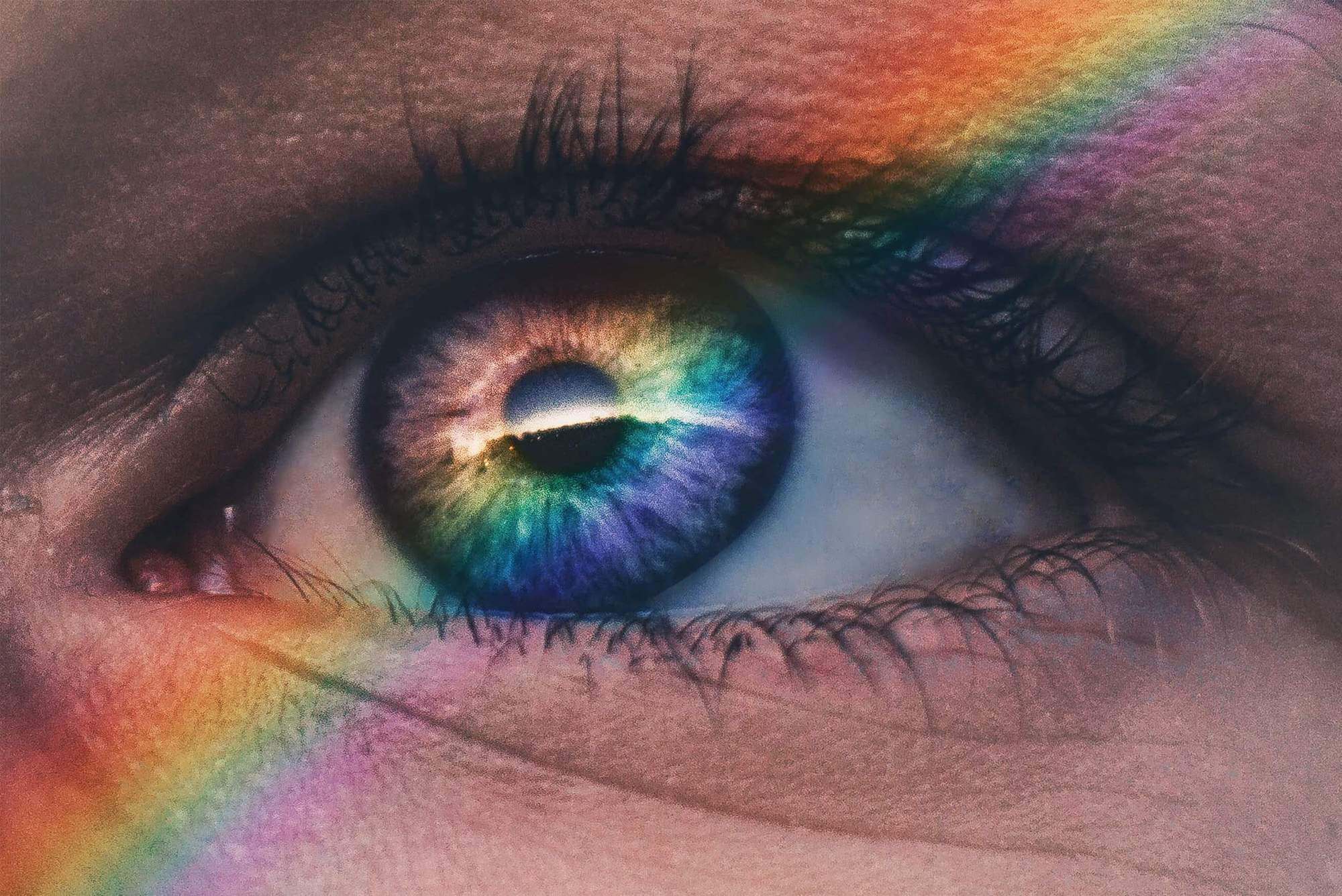
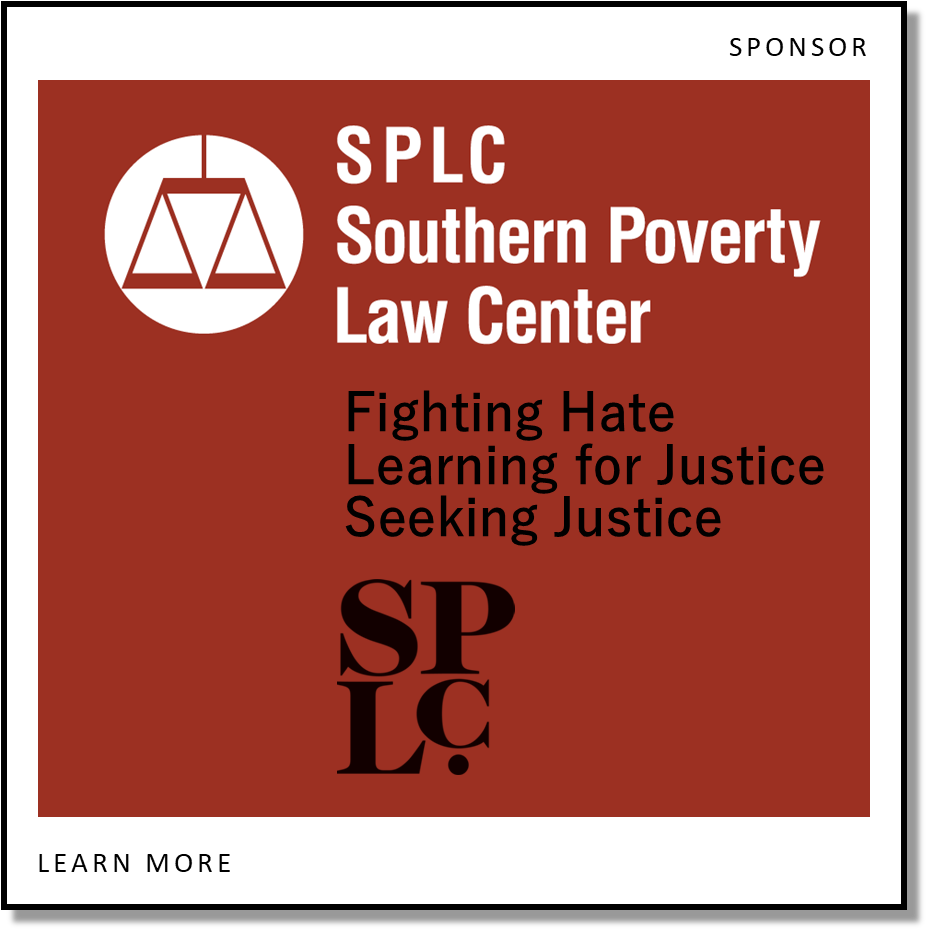
Discrimination
Stress and Anxiety
Cisnormative and Cissexism
Bullying and Suicide
Tragic Events
Hate
Crimes

Defining
Homophobia and Heterosexism
Heterocentrism -Ideology and assumption that all
people are or should be heterosexual and that LGBTQ
people are not important. It is an ongoing disregard for
and dismissal of LGBTQ people.
Heteronormative - Dominant belief or attitude,
which is a part of the heterocentric mindset, that
heterosexuality is the norm and that homosexuality is
somehow unnatural and wrong.
It
is the assumption that sexual and romantic relationships
must only be between a man and a woman.
Heterosexism - Belief in the inherent superiority of
heterosexuality and, thereby, it’s right to dominance
and power. This assumption supports a system in which
homosexual people are regarded as second-class citizens.
Homophobia - Fear, hatred, disgust, or
intolerance of same-sex intimacy, relationships,
atypical gender behavior, and/or people who identify as
or are perceived as LGBTQ. This manifestation is
characterized by mistreatment and oppression of LGBTQ
people.
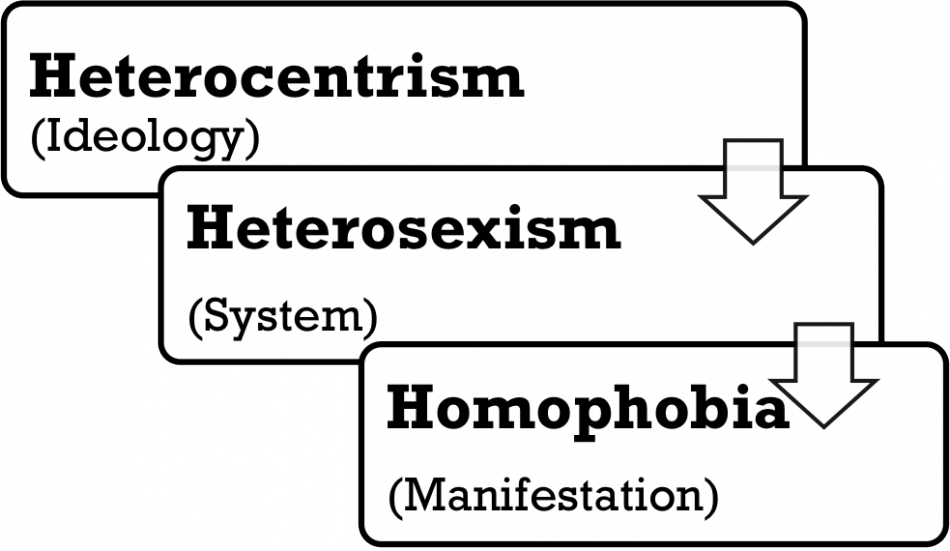
Homophobia refers to the many ways in which people are
oppressed on the basis of sexual orientation. Sometimes
homophobia is intentional, where there is a clear intent
to hurt lesbian, gay, bisexual, transgender, and queer
people. Homophobia can also be unintentional, where
there is no desire to hurt anyone, but where people are
unaware of the consequences of their actions.
There are
four distinct but interrelated types of homophobia:
personal, interpersonal, institutional, and cultural.
Institutional and cultural homophobia are often referred
to as heterosexism.
Personal homophobia is prejudice. It is the personal
belief that lesbian, gay, and bisexual people are
sinful, immoral, sick, inferior to heterosexuals, or
incomplete women and men. Prejudice towards any group is
learned behavior. People have to be taught to be
prejudiced.
Personal homophobia is sometimes experienced as the fear
of being perceived as lesbian, gay, bisexual,
transgender, or queer. This fear can lead to trying to
“prove” one’s heterosexuality. Anyone, regardless of
their sexual orientation, can experience personal
homophobia. When this happens with LGBTQ people, it is
sometimes called “internalized homophobia.”
Interpersonal homophobia is the fear, dislike, or hatred
of people believed to be lesbian, gay, or bisexual. This
hatred or dislike may be expressed by name-calling,
verbal and physical harassment, and individual acts of
discrimination or by the rejection of friends,
co-workers, and/or family members.
NY Times: Homophobic? Maybe You're Gay
Roots and Causes of Homophobia
Info: LGBTQ Discrimination
Homophobia: Origins and Cures
Video: Therapy Session for Homophobic People
Debate: Does Religion Cause Homophobia?
Info: Check
Your Attitude
Heterosexual Privilege: 30 Examples
Microaggressions: What
LGBTQ People Endure Daily
Internalized Homophobia: What is it? And
How Do You Overcome it?
Heteronormativity
Explained
An Illustration of Privilege
Info: Cisnormative
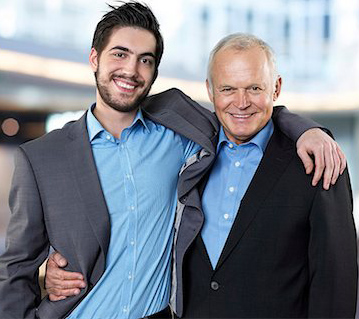
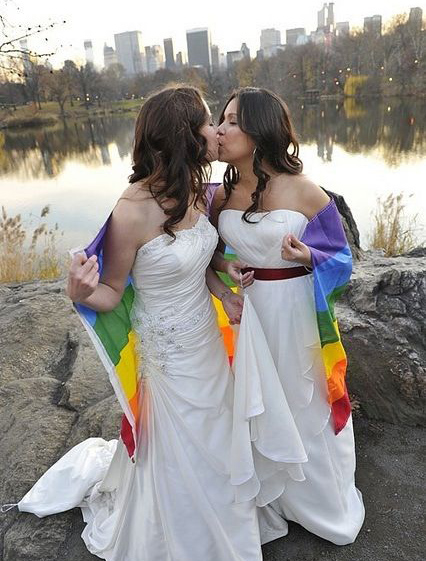
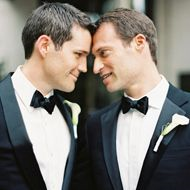
Lesbian,
gay, bisexual, transgender, and queer people are
regularly attacked for no other reason than their
assailants’ homophobia. Most people act out their fears
of lesbians and gay men in non-violent, more commonplace
ways. Relatives often shun their LGBTQ family members.
Co-workers are distant and cold to lesbian and gay
employees. Or people simply never ask about
acquaintances’ lives.
Institutional homophobia refers to the many ways in
which government, business, religious institutions, and
other institutions and organizations discriminate
against people on the basis of sexual orientation. These
organizations and institutions set policies, allocate
resources, and maintain both written and unwritten
standards for the behavior of their members in ways that
discriminate.
For example, many religious organizations have stated
policies against LGBTQ people holding offices. Many
schools fail or refuse to allocate funds and staff for
LGBTQ support groups. And many businesses have norms for
social events which prevent LGBTQ employees from
bringing their same sex partners while heterosexual
employees bring their opposite sex partners.
Cultural homophobia refers to social standards and norms
that dictate that being heterosexual is better or more
moral than being lesbian or gay, and that everyone is
heterosexual or should be. While these standards are not
written down as such, they are spelled out each day in
the television shows and print advertisements where
virtually every character is heterosexual and every
sexual relationship involves a female and a male; or in
the assumption made by most adults in social situations
that all “normal” children will eventually be attracted
to and marry a person of the other sex.
Often, heterosexuals don’t realize that these standards
exist, while LGBTQ people are acutely aware of the
standards. The feeling that results is one of being an
outsider in the society.
Transphobia Explained
NY Times: Homophobic? Maybe You're Gay
Heterosexual Privilege: 30 Examples
Roots and Causes of Homophobia
Info: Cisnormative
Homophobia: Origins and Cures
Info: Check
Your Attitude
Heteronormativity
Explained
An Illustration of Privilege
Privilege:
Straight White Guy
Info: LGBTQ Discrimination
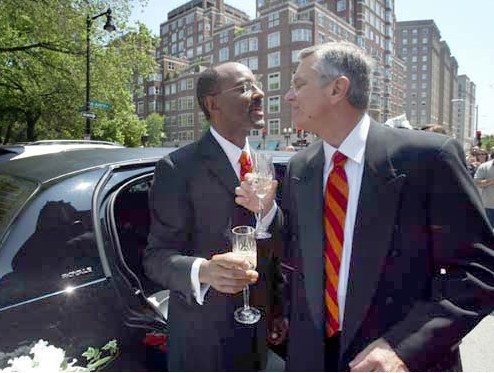
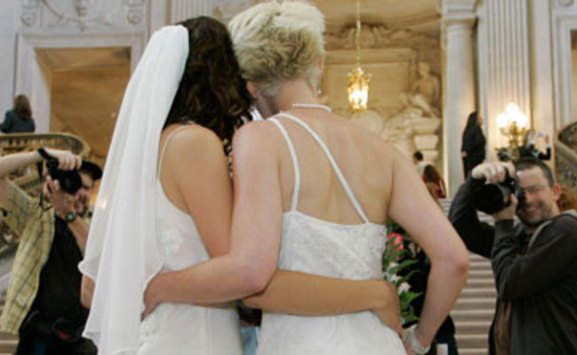
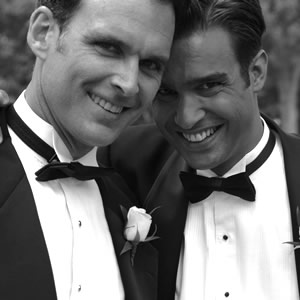
Defining
Transphobia and Cisnormativity
Similar to
homophobia, heterosexism, and heteronormativity (which
are directed at homosexual people), transphobia and
cisnormativity are directed at transgender and gender
non-conforming people.
Transphobia
- Fear, hatred, disgust, mistreatment, or
intolerance of transgender people. The prejudice
directed toward transgender people.
Cisnormativity - Belief in the inherent superiority of cisgender people and, thereby, it’s right to dominance.
A term referring to the assumption
that cisgender is the norm and that all, or almost all,
individuals are cisgender.
The presumption that
everyone is cisgender unless
otherwise specified.
Cisnormativity is a term related
to heteronormativity, heterosexism,
homophobia, biphobia,
transphobia, gender essentialism, cissexism,
and other forms of oppression
based on sexual orientation and
gender identity.
Cissexism
- Appeal to norms that enforce the gender binary and
gender essentialism, resulting in the oppression of
gender variant, non-binary, and transgender identities.
Also termed cisgenderism, cisnormativity or cissexual assumption,
occasionally used synonymously with transphobia.
Cisgenderism
- Assumption that, due to human
sexual differentiation, one's gender is determined
solely by a biological sex of male or female (based on
the assumption that all people must have either an XX or XY sex-chromosome pair, or, in the case of cisgenderism,
a bivalent male or female expression), and that trans
people are inferior to cisgender people due to being in
"defiance of nature."
Cisgender
Privilege - Set of unearned advantages that
individuals who identify with their biological sex
accrue solely due to having a cisgender identity.
Definitions: Homophobia, Heterosexism, Sexual Prejudice
Info: LGBTQ
Discrimination
Heteronormativity
Explained
This is What Homophobia Feels Like
Getting Up Close to Homophobia
50 Years a Scapegoat:
LGBTQ Community Once Again in GOP Crosshairs
Info: Check Your Attitude
PBS Frontline: Are You Homophobic?
Internalized Homophobia: What is it? And
How Do You Overcome it?
Gregory Herek: Understanding Sexual Prejudice
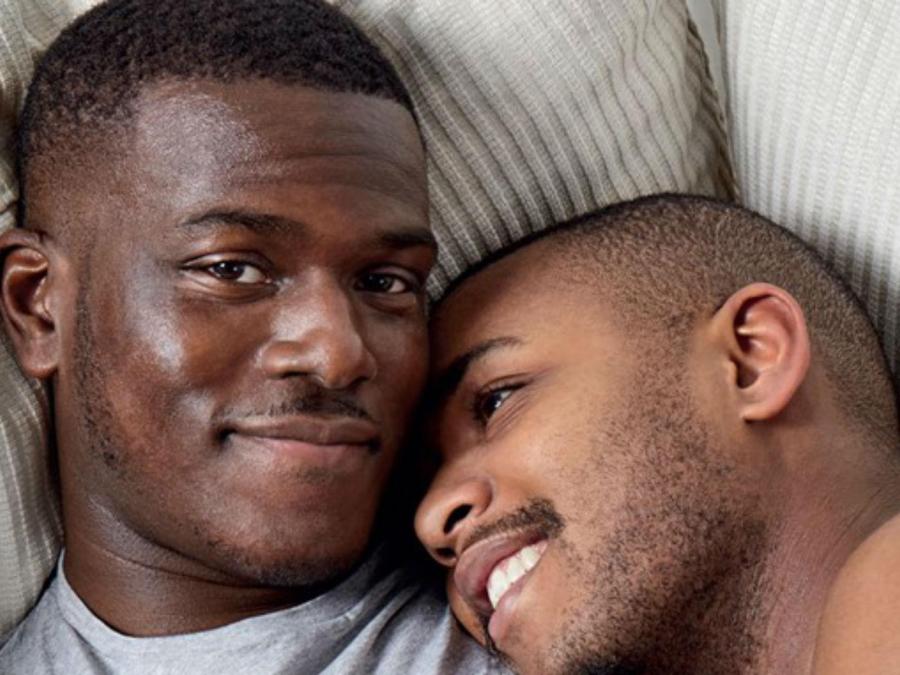

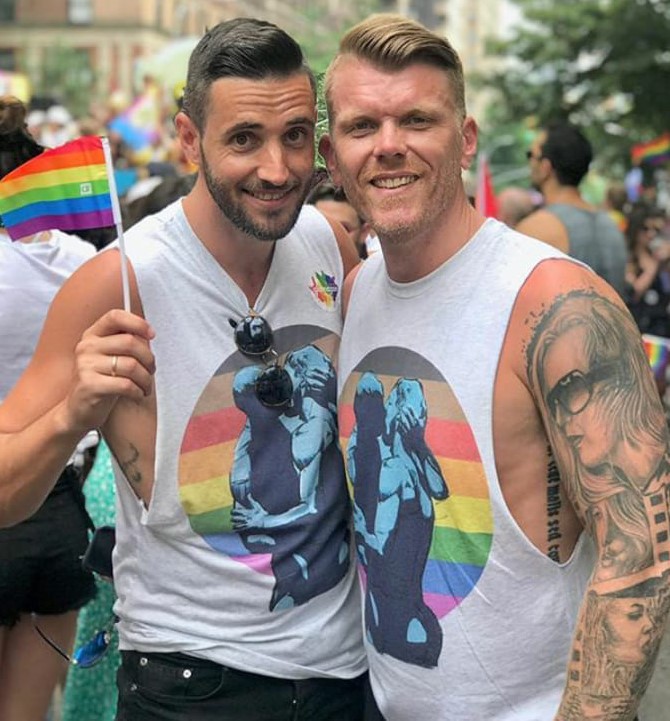
Relevant Comments
"It seems to me the most important issue in the LGBTQ
community is the right to be queer, the right to be free
of the heterosexual assumption."
-Jasmine Guy
"The widely held belief that the heterosexual nuclear
family is best for children has long been used as a
smoke screen for homophobia and as a talking point to
quash marriage-equality efforts."
-Jessica Valenti
"If there is a substantial difference between a gay
couple and a childless heterosexual couple, I'm unable
to see it."
-Daniel Keys Moran
"When you
hear someone say something homophobic, it really ages
them. It sounds old-fashioned."
-Kathryn
Prescott
"Maybe you are homophobic a little bit, but then you see
me, and you've always loved me. And then you're like,
Oh, that's OK. It's fine. Once it gets a little bit
more personal, it helps break down those barriers."
-Megan
Rapinoe
Definitions: Homophobia, Heterosexism,
Sexual Prejudice
This is What Homophobia Feels Like
I Didn't Like Gay People
Info: Check
Your Attitude
Heteronormativity Explained
Getting Up Close to Homophobia
50 Years a
Scapegoat: LGBTQ Community Once Again in
GOP Crosshairs
PBS Frontline: Are You Homophobic?
Info: LGBTQ
Discrimination
Transphobia Explained
Gregory Herek: Understanding Sexual
Prejudice
Mexican
Soccer Team Asks Fans to Halt Homophobic
Chants at Games
Wikipedia: Heterosexism
Heterosexual Privilege: 30 Examples
"There are homophobic people in my family. They're
deeply religious."
-Nelsan
Ellis
"We’re sick of hearing people say, That guy is so gay
or Those guys are fags. Gay is not a synonym for
shitty. If you wanna say something’s shitty, say it’s
shitty. Stop being such homophobic assholes."
-Pete Wentz
"The whole world goes on and on about love. Poets spend
their lives writing about it. Everyone thinks it's the
most wonderful thing. But, when you mention two guys in
love, they forget all that and freak out."
-Mark A. Roeder
"The only
thing wrong with being gay is how some people treat you
when they find out."
-Robin Reardon
"To be raped is to be sexually violated. For society to
force someone, through shame and ostracism, to comply
with love and sex that it defines, is nothing but
organized rape. That is what homophobia is all about.
Organized rape."
-Lee Maracle
“If you
homophobic, you just ugly.”
-Cardi B
Definitions: Homophobia, Heterosexism, Sexual Prejudice
How Privileged Are You?
Heterosexual Privilege: 30 Examples
This is What Homophobia Feels Like
Microaggressions: What
LGBTQ People Endure Daily
Heteronormativity
Explained
Video: Therapy Session for Homophobic People
Info: Cisnormative
Wikipedia: Heterosexism
I'm Not Homophobic...But...
This is What Homophobia Feels Like
Homophobia: Psychological Explanation
Getting Up Close to Homophobia
PBS Frontline: Are You Homophobic?
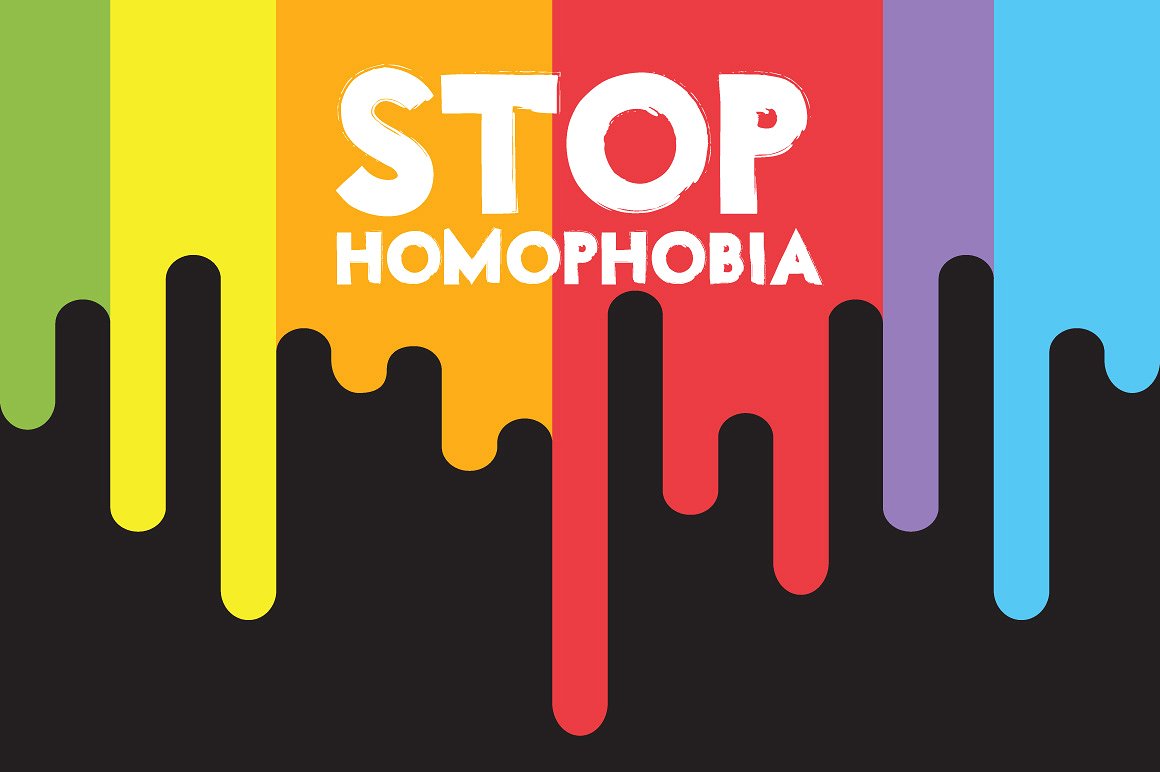
Oppressing
Sexual Minorities
For purposes of sociological categorization, homosexual,
transgender, and queer people are considered to be
members of a sexual minority. The term sexual
minority refers to any identity, orientation,
expression, lifestyle, or practice that doesn’t comply with the
mainstream heterosexual or cisgender concept of normal
sexual or gender behavior.
The term
sexual minority can be used as an umbrella term
to encompass any group or individual who identifies as
homosexual, gay, lesbian, bisexual, pansexual, polysexual, asexual,
transgender, transsexual, genderqueer,
gender-nonconforming, gender variant, agender, intersex,
androgynous, drag, polyamorous, kinky, or otherwise queer.
As members
of a sexual minority, LGBTQ people are often subject to
the rules and attitudes of the majority heterosexual or
straight community. There is a potential in a
heterocentric environment (or ideology) to breed
heterosexism (or a heterosexist system) that results in
heterosexual privilege and homophobia. As with any
minority group, there is risk of oppression from members
of the majority group.
Using the
term sexual minority in certain conversations
helps to focus on the potential for oppression,
prejudice, and discrimination by the majority group. A
civilized society recognizes that minority voices must
be heard and that members of the minority community must
be included.
Heterosexism is the assumption that only heterosexual
relationships are normal and should therefore be
privileged. Heterosexism is based on societal values
that dictate that everyone is, or should be,
heterosexual.
Intentionally or unintentionally, our society bestows privileges
on heterosexuality and heterosexual persons, and devalues,
mistreats, or discriminates against lesbian, gay,
bisexual, transgender, and queer persons and those
perceived to be so.
Heterosexual privilege bestows unearned and unchallenged
advantages and rewards on heterosexuals solely as a
result of their sexual orientation. These benefits are
not automatically granted to LGBTQ persons.
Definitions: Homophobia, Heterosexism, Sexual Prejudice
Info: LGBTQ
Discrimination
This is What Homophobia Feels Like
Heterosexual Privilege: 30 Examples
Getting Up Close to Homophobia
Info: Check Your Attitude
PBS Frontline: Are You Homophobic?
Gregory Herek: Understanding Sexual Prejudice
Privilege: Straight White Guy
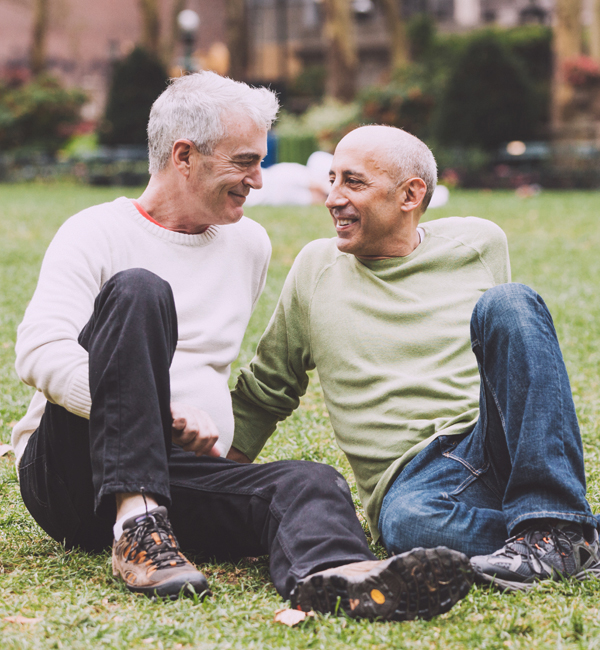
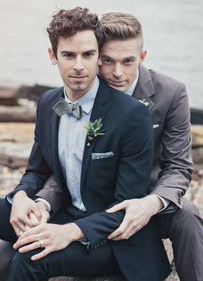

Sexual
Minorities and the Media
Sexual
minorities are generally portrayed in the mass media as
being ignored, trivialized, or condemned. The term
symbolic annihilation accounts for their lack of
characterization due to not fitting into the white,
heterosexual, vanilla type lifestyle.
Some
individuals have made their way into the media through
television and music. TV shows such as The Ellen
DeGeneres Show and ABC’s Modern Family star
individuals who are open about their non-heterosexual
lifestyles.
While
sexual minorities do have a place in the media, it is
often critiqued that they are still limited in their
representations. In shows, if a character is gay, they
are often a very shallow character that is only present
for comic relief or as a plot twist. Compared to a
heteronormative counterpart, the sexual minority is
often a mere side-kick. However, since the integration
of actors, musicians, and characters of sexual
minorities, the idea of non-normativity has become more
normalized in society.
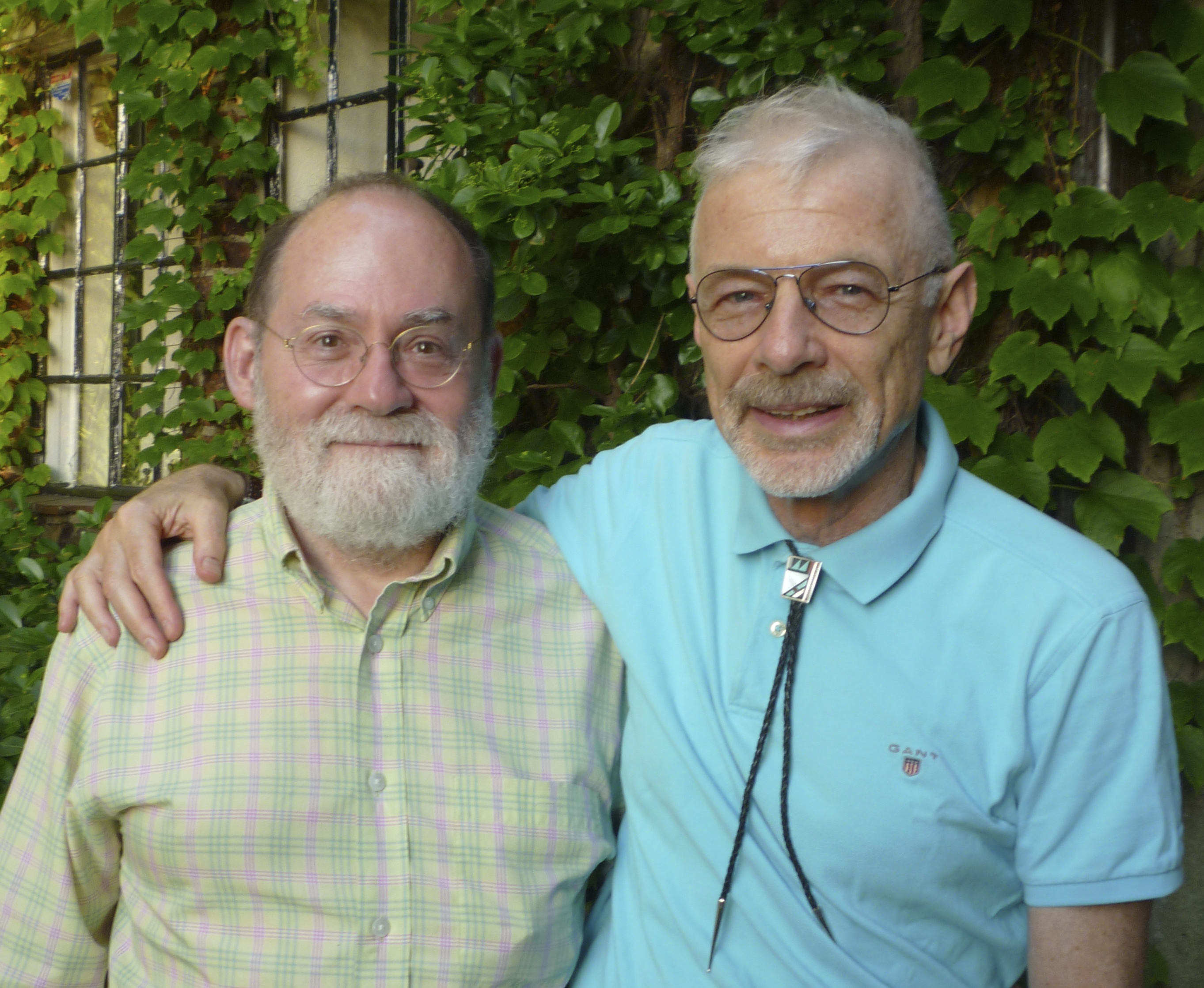
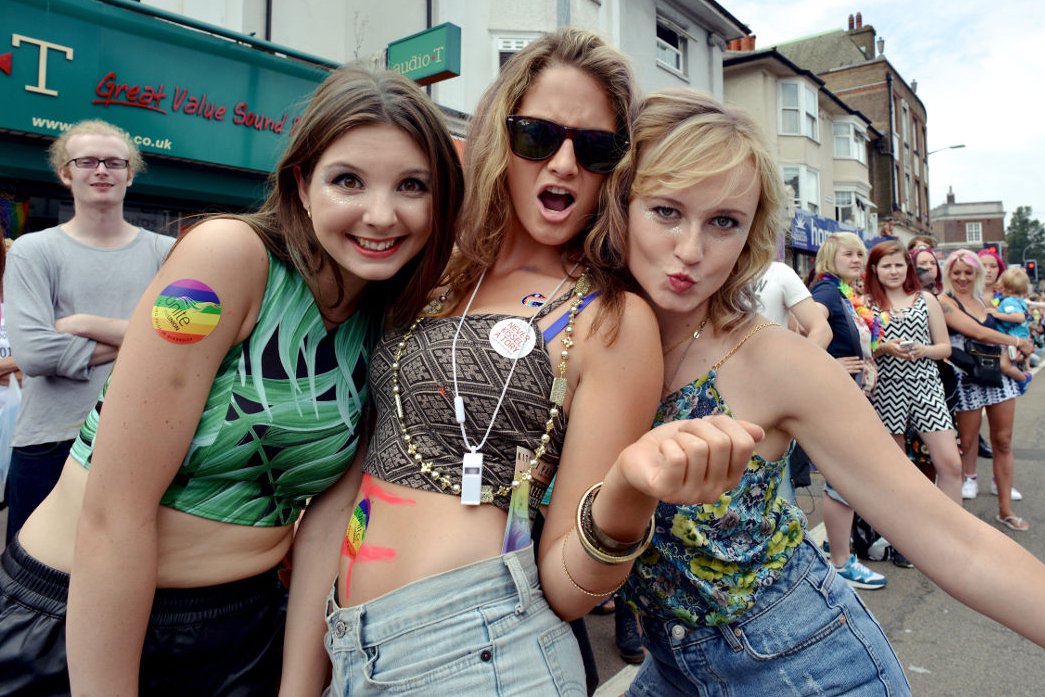
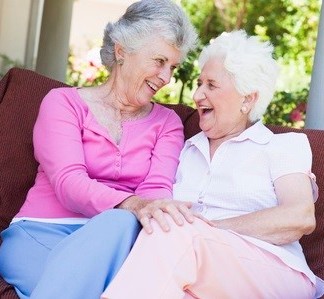
Defining
Privilege
If you have never had a Supreme Court case decide if
you have the same rights as others... you have
privilege.
A person who is privileged is not subject to the usual
rules or penalties because of some special circumstance.
Privilege is an unearned right, immunity, or benefit
enjoyed by a particular person or a restricted group of
people beyond the advantages of most. It is the unearned
and mostly unacknowledged societal advantage that a
restricted group of people has over another group. It is
a special right, immunity, or exemption granted to
persons in authority or office to free them from certain
obligations or liabilities. Examples include the
socioeconomic privileges of the very rich, white
privilege based on skin color, male privilege,
heterosexual privilege.
Definitions: Homophobia, Heterosexism, Sexual Prejudice
Wikipedia: Heterosexism
Roots and Causes of Homophobia
Internalized Homophobia: What is it? And
How Do You Overcome it?
Info: Cisnormative
Homophobia: Origins and Cures
Privilege Walk: What is Privilege
Heterosexual
Privilege
Heterosexual privilege means living without ever having
to think twice, face, confront, engage, or cope with
anything listed below. Heterosexuals can address these
phenomena, but social/political forces do not require
them to do so.
Not questioning your normalcy, sexually and culturally:
--Having role models of your gender and sexual
orientation.
--Learning about romance and relationships from fiction,
movies, and television.
--Having positive media images of people with whom you
can identify.
Validation
from the culture, friends, and family:
--Living with your partner and doing so openly to all.
--Talking about your relationship, and what projects,
vacations, and family planning you and your
lover/partner are creating.
--Expressing pain when a relationship ends and having
other people notice and attend to your pain.
--Receiving social acceptance from neighbors,
colleagues, and new friends.
--Not having to hide and lie about gay/lesbian friends
and social activities.
--Dating the person of the gender you desire in your
teen years.
--Kissing/hugging/being affectionate in public without
threat or punishment.
--Living comfortably in a residence hall without
enduring the fear of rejection from roommates or other
residents.
--Dressing without worrying about what it represents.
--Working without being identified by your
sexuality/culture (you get to be a farmer, bricklayer,
or artist without being labeled the heterosexual farmer,
the heterosexual bricklayer, or the heterosexual
artist).

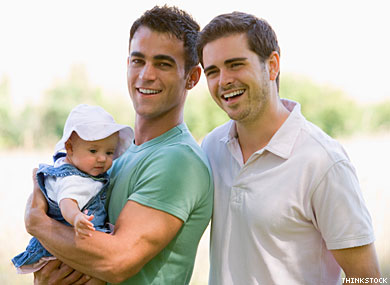
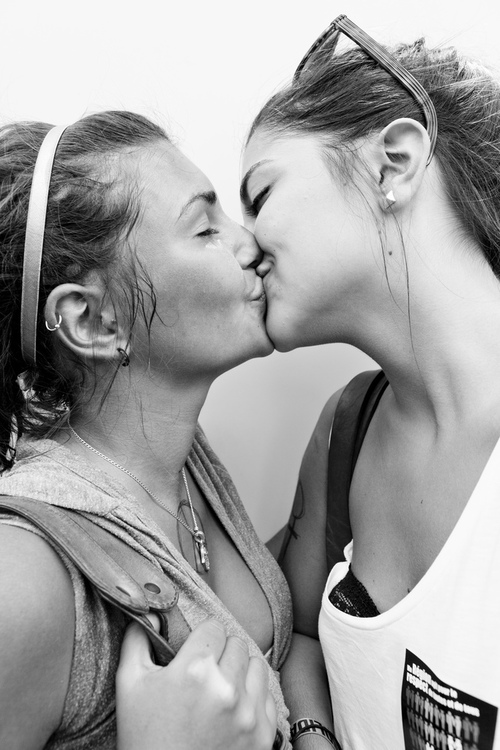
Privilege: Straight White Guy
Definitions: Homophobia, Heterosexism, Sexual Prejudice
Info: LGBTQ
Discrimination
This is What Homophobia Feels Like
Heterosexual Privilege: 30 Examples
Getting Up Close to Homophobia
Info: Check Your Attitude
PBS Frontline: Are You Homophobic?
Gregory Herek: Understanding Sexual Prejudice
Institutional Acceptance:
--Increased possibilities for getting a job, receiving
on the job training and promotion.
--Receiving validation from your religious community,
being able to be a member of the clergy/religious
leadership.
--Being employed as a teacher in pre-school through high
school without fear of being fired any day because you
are assumed to corrupt children.
--Adopting children, foster-parenting children.
--Raising children without threats of state
intervention, without children having to be worried
which of their friends might reject them because of
their parent’s sexuality and culture.
--Being able to serve in the military.
--Receiving equal benefits for you and your partner.
Legal marriage, which includes the following privileges:
--Public recognition and support for an intimate
relationship.
--Celebration of your commitment to another with gifts,
cards, and congratulations from others.
--Social expectations of longevity and stability for
your committed
relationships.
--Joint child custody.
--Paid leave from employment and condolences when
grieving the death of your partner/lover.
--Property laws, filing joint tax returns, inheriting
from your partner/lover automatically under probate
laws.
--Sharing health, auto, and homeowners’ insurance
policies at reduced rates.
--Immediate access to your loved ones in cases of
accident or emergency.
--Family-of-origin support for a life partner/lover.
--Access
to a hospitalized love one.
Definitions: Homophobia, Heterosexism, Sexual Prejudice
Info: LGBTQ
Discrimination
This is What Homophobia Feels Like
Heterosexual Privilege: 30 Examples
Getting Up Close to Homophobia
Info: Check Your Attitude
PBS Frontline: Are You Homophobic?
Gregory Herek: Understanding Sexual Prejudice
Wikipedia: Heterosexism
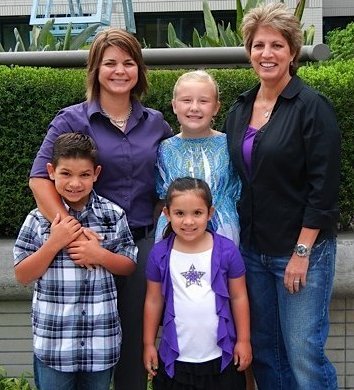
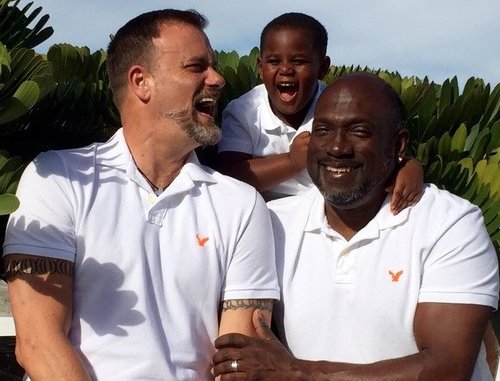
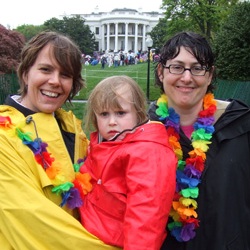
Sexual Prejudice
LGBTQ people have long been stigmatized. With the rise
of the gay political movement in the late 1960s,
however, homosexuality's condemnation as immoral,
criminal, and sick came under increasing scrutiny. When
the American Psychiatric Association dropped
homosexuality as a psychiatric diagnosis in 1973, the
question of why some heterosexuals harbor strongly
negative attitudes toward homosexuals began to receive
serious scientific consideration.
Homophobia
Society's rethinking of sexual orientation was
crystallized in the term homophobia, which heterosexual
psychologist George Weinberg coined in the late 1960s.
Weinberg used homophobia to label heterosexuals' dread
of being in close quarters with homosexuals as well as
homosexuals' self loathing. The word first appeared in
print in 1969 and was subsequently discussed at length
in Weinberg's 1972 book, Society and the Healthy
Homosexual.
The American Heritage Dictionary (1992 edition) defines
homophobia as "aversion to gay or homosexual people or
their lifestyle or culture" and "behavior or an act
based on this aversion." Other definitions identify
homophobia as an irrational fear of homosexuality.
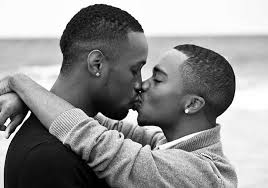
Privilege: Straight White Guy
NY Times: Homophobic? Maybe You're Gay
Roots and Causes of Homophobia
Heteronormativity
Explained
Internalized Homophobia: What is it? And
How Do You Overcome it?
Info: Check Your Attitude
Homophobia: Origins and Cures
Lady Gaga: Till it Happens
to You
Heterosexism
Around the same time, heterosexism began to be used as a
term analogous to sexism and racism, describing an
ideological system that denies, denigrates, and
stigmatizes any nonheterosexual form of behavior,
identity, relationship, or community (Herek, 1990).
Using the term heterosexism highlights the parallels
between antigay sentiment and other forms of prejudice,
such as racism, antisemitism, and sexism.
Like institutional racism and sexism, heterosexism
pervades societal customs and institutions. It operates
through a dual process of invisibility and attack.
Homosexuality usually remains culturally invisible; when
people who engage in homosexual behavior or who are
identified as homosexual become visible, they are
subject to attack by society.
Examples of heterosexism in the United States include
the continuing ban against lesbian and gay military
personnel; widespread lack of legal protection from
antigay discrimination in employment, housing, and
services; hostility to lesbian and gay committed
relationships, recently dramatized by passage of federal
and state laws against same-gender marriage; and the
existence of sodomy laws in more than one-third of the
states.
Although usage of the two words has not been uniform,
homophobia has typically been employed to describe
individual antigay attitudes and behaviors whereas
heterosexism has referred to societal-level ideologies
and patterns of institutionalized oppression of
non-heterosexual people.


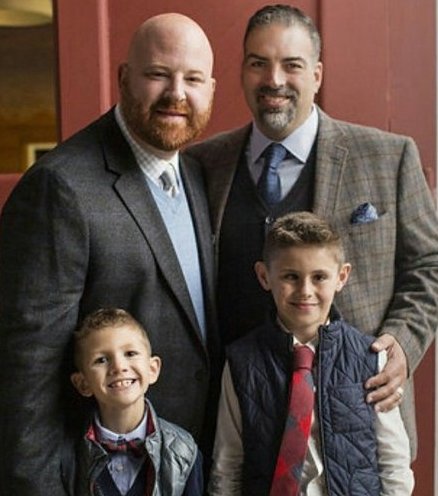
Debate: Does Religion Cause Homophobia?
Info: Cisnormative
Heterosexual Privilege: 30 Examples
We Kiss in a Shadow
Video: Therapy Session for Homophobic People
Microaggressions: What
LGBTQ People Endure Daily
An Illustration of Privilege
Info: LGBTQ Discrimination
Transphobia Explained
Limitations
By drawing popular and scientific attention to antigay
hostility, the creation of these terms marked a
watershed. Nevertheless, they have important
limitations.
Critics have observed that the term "homophobia" is problematic for
at least two reasons.
First, empirical research does not indicate that
heterosexuals' antigay attitudes can reasonably be
considered a phobia in the clinical sense. Indeed, the
limited data available suggest that many heterosexuals
who express hostility toward gay men and lesbians do not
manifest the physiological reactions to homosexuality
that are associated with other phobias (see Shields &
Harriman, 1984).
Second, using homophobia implies that antigay prejudice
is an individual, clinical entity rather than a social
phenomenon rooted in cultural ideologies and intergroup
relations. Moreover, a phobia is usually experienced as
dysfunctional and unpleasant. Antigay prejudice,
however, is often highly functional for the
heterosexuals who manifest it.
As antigay attitudes have become increasingly central to
conservative political and religious ideologies since
the 1980s, these limitations have become more
problematic. However, heterosexism, with its historic
macro-level focus on cultural ideologies rather than
individual attitudes, is not a satisfactory replacement
for homophobia.
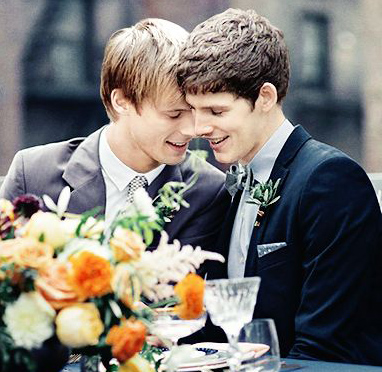
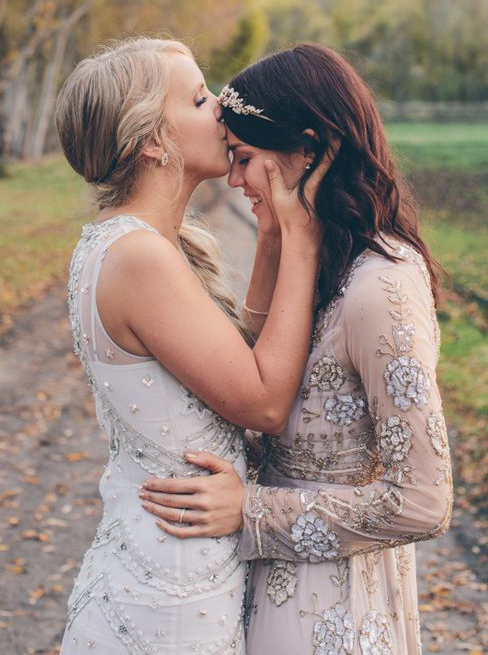
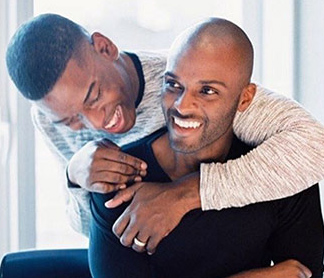
Sexual Prejudice
Scientific analysis of the psychology of antigay
attitudes will be facilitated by a new term. Sexual
prejudice serves this purpose nicely. Broadly conceived,
sexual prejudice refers to all negative attitudes based
on sexual orientation, whether the target is homosexual,
bisexual, or heterosexual. Given the current social
organization of sexuality, however, such prejudice is
almost always directed at people who engage in
homosexual behavior or label themselves gay, lesbian, or
bisexual (Herek, 2000).
Like other types of prejudice, sexual prejudice has
three principal features:
--It is an attitude (an evaluation or judgment).
--It is directed at a social group and its members.
--It is negative, involving hostility or dislike.
Conceptualizing heterosexuals' negative attitudes toward
homosexuality and bisexuality as sexual prejudice (rather than homophobia) has several advantages. First,
sexual prejudice is a descriptive term. Unlike
homophobia, it conveys no a priori assumptions about the
origins, dynamics, and underlying motivations of antigay
attitudes.
Second, the term explicitly links the study of antigay
hostility with the rich tradition of social
psychological research on prejudice.
Third, using the construct of sexual prejudice does not
require value judgments that antigay attitudes are
inherently irrational or evil.
[Source: Herek, G. M., The context of anti-gay violence:
Notes on cultural and psychological heterosexism,
Journal of Interpersonal Violence, 1990. Herek, G. M.,
The psychology of sexual prejudice, Current Directions
in Psychological Science, 2000. Shields, S. A., &
Harriman, R. E., Fear of male homosexuality: Cardiac
responses of low and high homonegative males, Journal of
Homosexuality, 1984]
NY Times: Homophobic? Maybe You're Gay
Roots and Causes of Homophobia
Heteronormativity
Explained
Internalized Homophobia: What is it? And
How Do You Overcome it?
Info: Check Your Attitude
Homophobia: Origins and Cures
Lady Gaga: Till it Happens
to You
Debate: Does Religion Cause Homophobia?
Info: Cisnormative
Heterosexual Privilege: 30 Examples
We Kiss in a Shadow
Video: Therapy Session for Homophobic People
Microaggressions: What
LGBTQ People Endure Daily
An Illustration of Privilege
Info: LGBTQ Discrimination
Transphobia Explained
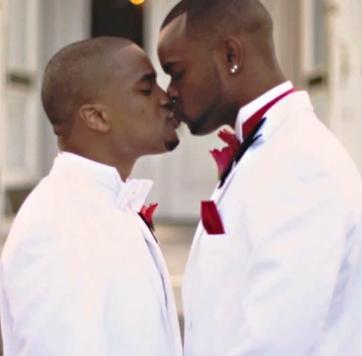
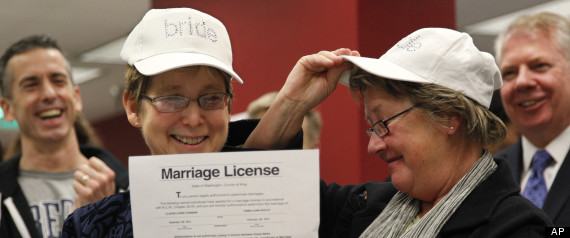
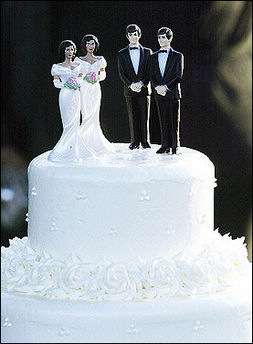
Homonegativity
It has
been suggested that "homophobia" is not an entirely
appropriate term in all circumstances to describe
anti-gay attitudes and sexual prejudice towards LGBTQ
people. There is a difference between homophobia and
homonegativity. Increasingly, the term "homonegativity" has been
used in a clinical way by some researchers.
Homonegativity describes
a negative attitude or disapproval towards homosexuality
or homosexual people. Like homophobia, it is an
oppressive mindset and
social force that deleteriously affects the lives and
well-being of gay men and lesbian women.
Those who
express homonegative attitudes draw upon their religious
beliefs, internal affective reactions, and beliefs that
homosexuality is unnatural and a choice in order to make
sense of their homonegativity.
"Homophobia" is a description of
emotions and feelings towards homosexuality, such as
fear, hatred or aversion. Meanwhile, "homonegativity"
refers to an
intellectual dismissal or disapproval of homosexuality.

Examining
Heterosexual Privilege
I Have
Heterosexual Privilege if...
--I don’t have to worry about hiding my friends,
partner, and my weekend activities and can talk about it
when I come in to work on Monday morning.
--I don’t have to feel like a split personality.
--I am able to be fully who I am at work or school
without having to worry about what others may say about
my partner or friends.
--I don’t have to lead a double life.
--I should need to move, I can be pretty sure that my
neighbors will be neutral, pleasant, and/or accepting of
me.
--I can turn on the TV or radio or open up to the front
page of the paper and see people of my orientation
widely and positively represented.
--When people talk about our national heritage or
civilization, I am shown that people like me did
contribute to it in positive and healthy ways.
--I can, at my workplace, talk about my partner or have
a picture on my desk, without fearing that people will
automatically disapprove or think that I am being
“flamboyant,” “blatant,” or “forcing my beliefs” upon
them.
--I can be open about my sexual orientation at work
without fear of reprisal in terms of job promotion, loss
of job, or be accused of negatively affecting the work
climate.
--I can bring my partner to work related parties and
events and be seen as promoting a positive familial
climate.
--I can get paid leave from work and/or condolences when
grieving for the death of a long term partner.
--My friends can be seen with me without being afraid of
being labeled by others.
--I can go apartment or house hunting with my partner
without fear of reprisal.

Definitions: Homophobia, Heterosexism, Sexual Prejudice
Microaggressions: What LGBTQ People
Endure Daily
Info: LGBTQ
Discrimination
Privilege: Straight White
Guy
This is What Homophobia Feels Like
Getting Up Close to Homophobia
Info: Check Your Attitude
Heteronormativity
Explained
We Kiss in a Shadow
PBS Frontline: Are You Homophobic?
Gregory Herek: Understanding Sexual Prejudice
Lady Gaga: Till it Happens
to You
Wikipedia: Heterosexism
--I can, if I wish, arrange to be in the company of
people of my sexual orientation most of the time.
--I can avoid spending time with people who look upon my
sexual orientation with repulsion, hatred, loathing, or
even pity.
--I can publicly hold hands, kiss, or otherwise express
affection to my loved one without fear of harassment or
attack.
--I can express myself sexually without the fear of
being prosecuted for breaking the law.
--My romantic and emotional intimacies have not been
reduced to being based upon an act of sex.
--I can go wherever I want and know that I will not be
harassed, beaten, mugged, or killed because of my sexual
orientation.
--I can talk about my sexual orientation without people
thinking that it is abnormal, unnatural, a crime against
God or Nature, or that I am a freak.
--I have never been accused of being “disgusting,” of
flaunting my sexuality, or of being obsessed with sex
for sharing romantic experiences.
--I can expect my family to include me and my partner at
family events, occasions and gatherings.
--I can be pretty sure I will not be denied the right to
marry whomever I choose to.
--I need not fear emotional and financial truncation
from my family because of my sexual orientation.
--If I decide to adopt a child, I am perfectly certain
that my sexual orientation will not be an issue of
concern; or that I will be seen as influencing a child
towards a particular sexual orientation.
--I can be pretty sure that I can raise, adopt, and
teach children without people believing that I am a
child molester or will force them into my sexual
orientation.
--I can be
sure that my children will be given curricular materials
that testify to our familial existence in positive ways.
--I can raise my children without fear of state
intervention because of my sexual orientation.
--I can be pretty sure that my children will not be made
fun of, ridiculed, or harassed because of who raises
them.
--I can approach my medical doctor and be open about my
health and illnesses without fear of being judged or
denied service.
--I can approach the legal system, social service
organizations, and government agencies without fearing
discrimination because of my sexual orientation.
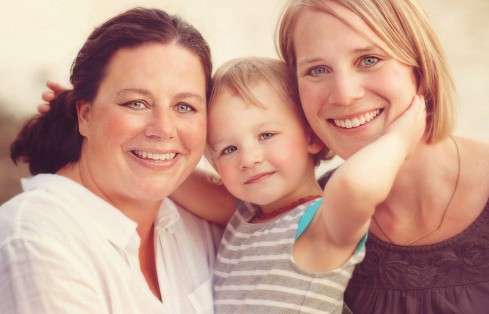
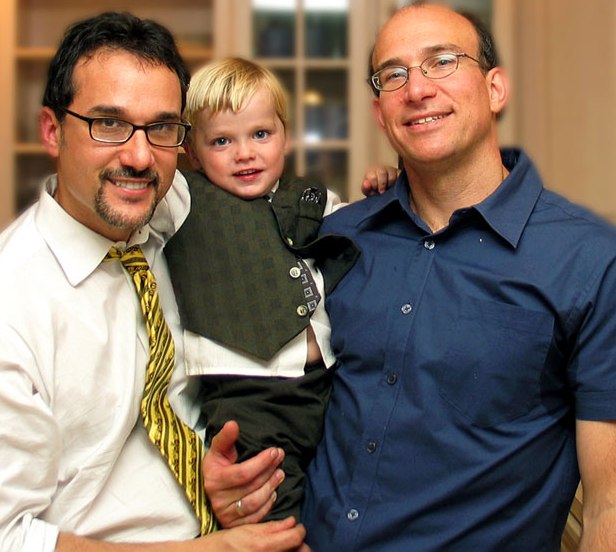
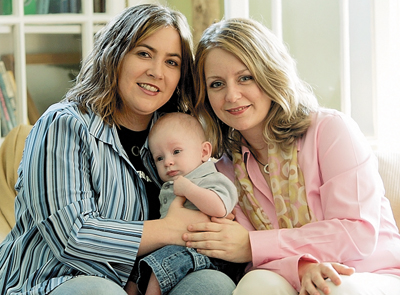
--I can join the military and be open about my sexual
orientation.
--I can belong to a religious organization or
denomination of my choice and know that I will not be
condemned or denounced by the religious leaders and the
members because of my sexual orientation.
--I can be close friends with people who do not share my
sexual orientation.
--I can teach from pre-school through high-school
without fear of being fired any day.
--I can teach about lesbians, gay men, bisexuals, and
transgender or intersex people without being seen as
having “a bias” because of my orientation, or of forcing
a “homosexual or personal agenda” on students.
--I can easily find academic courses and institutions
that give attention to people of my sexual orientation.
--I can go home from most meetings of organizations I
belong to feeling tied in and accepted, rather than
isolated, outnumbered, held at a distance, or feared.
--I can worry about homophobia without being seen as
self-interested or self-seeking.
--I have the right to inherit jointly-owned property
when my partner passes away.
--I can receive tax breaks, health and insurance
coverage, and spousal legal rights through being in a
long term relationship.
--I can get auto and homeowners’ insurance policies at
reduced rates with my partner.
--I have the right to visit my partner in the hospital
and intensive care and make important medical decisions
for him/her.
--I can legally sponsor my partner to live in the United
States who is not a US citizen or Permanent Resident.
--I can expect that most social institutions will
validate me by social gestures such as nurture, support,
and the usual celebratory cards, emails, and phone calls
that celebrate who I am and my relationship to another
person.
--I don’t have to constantly explain that I am not “a
pedophile.”
--I have never been asked if I am heterosexual because I
had a bad homosexual experience.
--I have never been accused of hating women because I am
married to a man.
[Source: Shiva Subbaraman, University of Maryland]
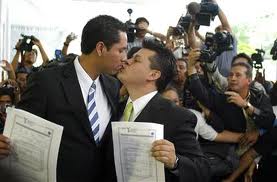
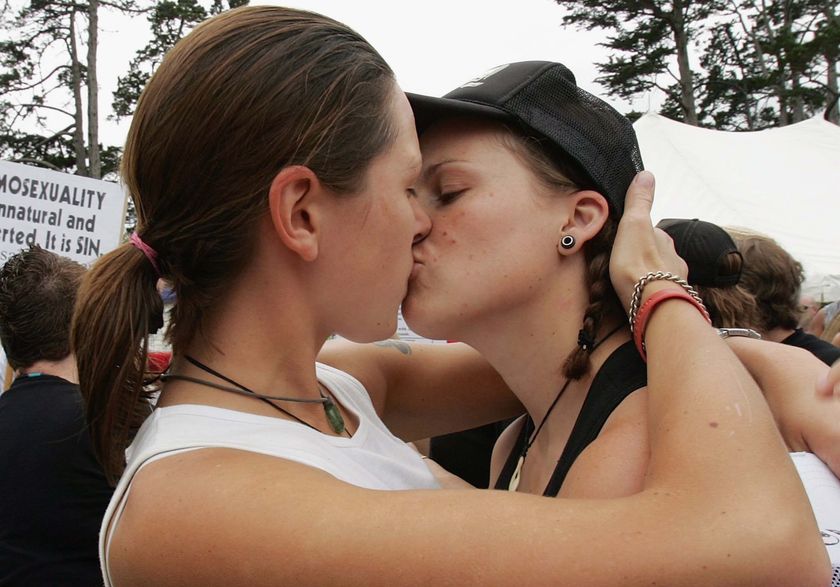

Definitions: Homophobia, Heterosexism, Sexual Prejudice
Microaggressions: What LGBTQ People
Endure Daily
Info: LGBTQ
Discrimination
This is What Homophobia Feels Like
Getting Up Close to Homophobia
Info: Check Your Attitude
Heteronormativity
Explained
We Kiss in a Shadow
PBS Frontline: Are You Homophobic?
Gregory Herek: Understanding Sexual Prejudice
Lady Gaga: Till it Happens
to You
Wikipedia: Heterosexism

LGBTQ
Discrimination
Homophobia/biphobia/transphobia take many different
forms, including physical acts of hate, violence, verbal
assault, vandalism or blatant discrimination such as
firing an employee, evicting someone from their housing
or denying them access to public accommodations. There
are many other kinds of homophobia/biphobia/transphobia
and heterosexism that happen every day. We often
overlook these more subtle actions and exclusions
because they seem so insignificant by comparison. They
are not. The following are examples of homophobia/biphobia/transphobia.
--Looking at an LGBTQ person and automatically thinking
of his or her sexuality or gender rather than seeing
her/him as a whole, complex person.
--Failing to be supportive when your LGBTQ friend is sad
about a quarrel or breakup.
--Changing your seat in a meeting because an LGBTQ
person sat in the chair next to yours.
--Thinking you can spot one.
--Using the terms “lesbian” or “gay” as accusatory.
--Not asking about a woman’s girlfriend/partner or a
man’s boyfriend/partner although you regularly ask “How
is your husband/wife?” when you run into a heterosexual
friend.
--Thinking that a lesbian (if you are female) or gay man
(if you are male) is making sexual advances if he or she
touches you.
--Feeling repulsed by public displays of affection
between lesbians and gay men but accepting the same
affectional displays between heterosexuals.
--Feeling that LGBTQ people are too outspoken about
civil rights.
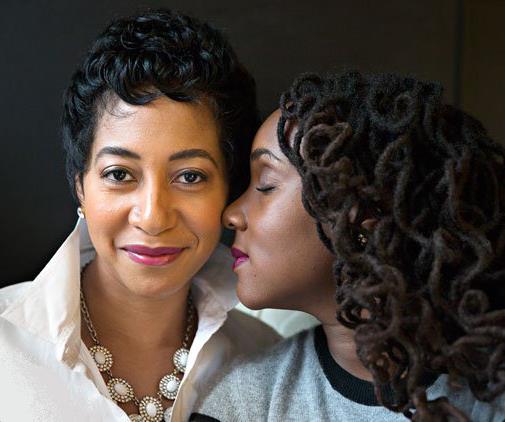
--Assuming all LGBTQ people are sexually active.
--Feeling that discussions about homophobia and
heterosexism are not necessary since you are “okay” on
these issues.
--Assuming that everyone you meet is heterosexual.
--Feeling that a lesbian is just a woman who couldn’t
find a man or that a lesbian is a woman who wants to be
a man.
--Feeling that a gay man is just a man who couldn’t find
a woman or that a gay man is a man who wants to be a
woman.
--Not confronting a homophobic remark for fear of being
identified with or as LGBTQ.
--Worrying about the effect an LGBTQ volunteer/co-worker
will have on your work or your clients.
--Wondering why lesbians and gay men have to “flaunt”
their sexuality, when all around you on TV, billboards,
and in film heterosexuals are exhibiting much more
blatant behavior.
--Avoiding mentioning to your friends that you are
involved with a women’s organization or a men’s
organization that emphasizes domestic skills, because
you are afraid that they will think you are LGBTQ.
--Asking your LGBTQ colleagues to comment on LGBTQ
issues, but not about other issues about which they may
be knowledgeable.
--Assuming that a lesbian or gay man would be
heterosexual if given an opportunity.
--Focusing exclusively on someone’s sexual orientation
and not on other issues of concern.
--Being outspoken about LGBTQ rights, but making sure
everyone knows that you are heterosexual.
--Being afraid to ask questions about LGBTQ issues when
you don’t know the answers.
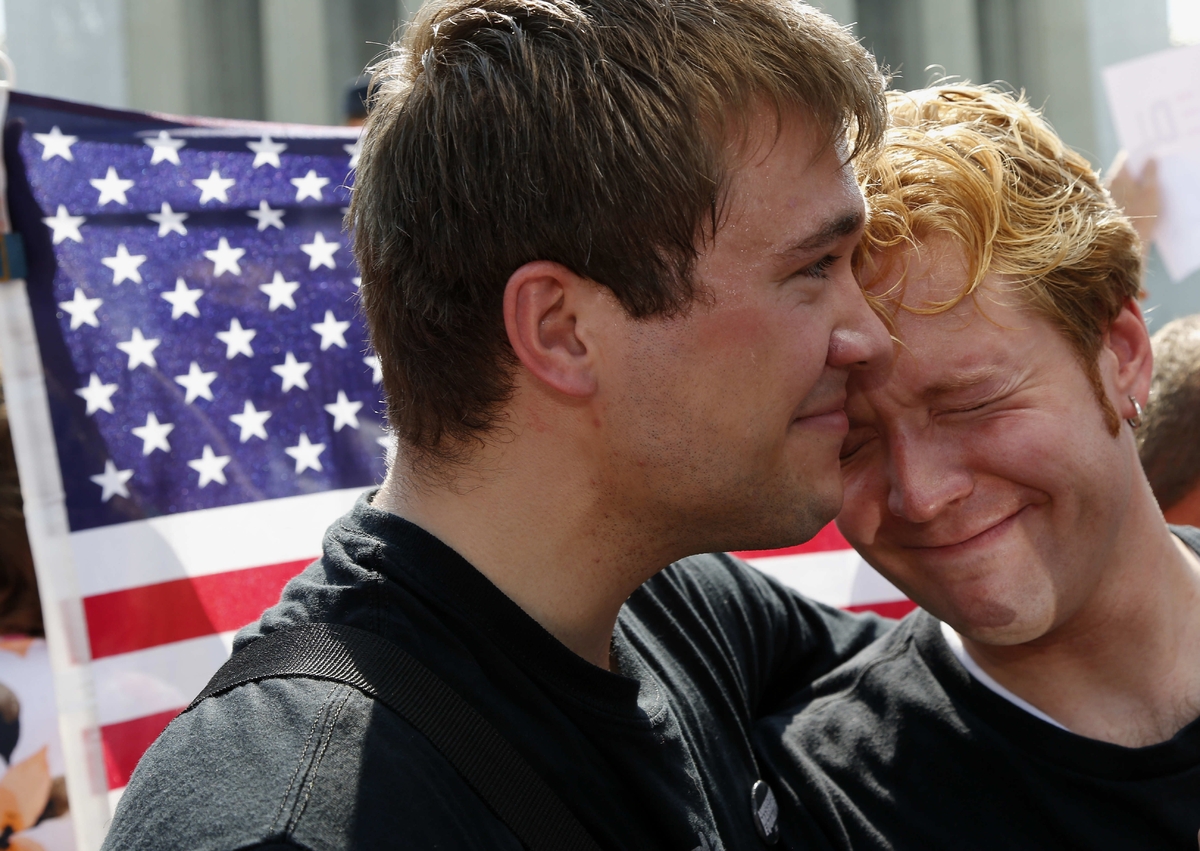
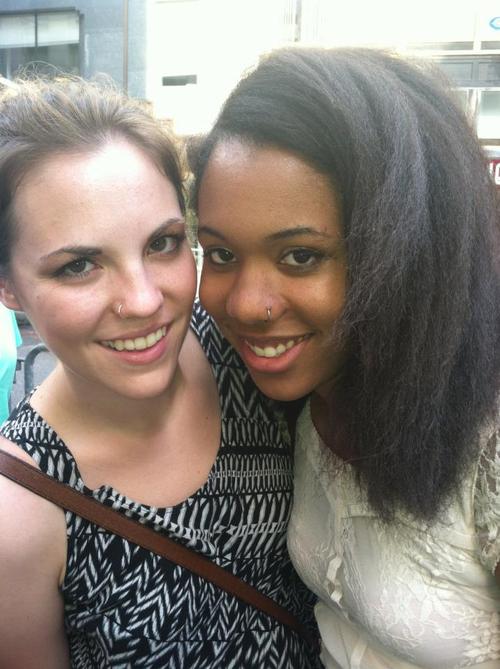
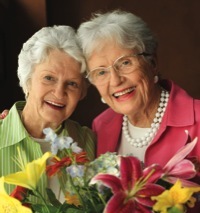
NY Times: Homophobic? Maybe You're Gay
Roots and Causes of Homophobia
Info: Check Your Attitude
Homophobia: Origins and Cures
Transphobia Explained
Debate: Does Religion Cause Homophobia?
Info: Cisnormative
Video: Therapy Session for Homophobic People
An Illustration of Privilege
Info: LGBTQ Discrimination
Privilege: Straight White Guy
Interrupting
Prejudice
We are surrounded by examples of active prejudice on a
daily basis. Generally expressed through speech, we
encounter racism, sexism, homophobia, and other forms of
prejudice in a variety of settings. For those who
work diligently to oppose bigoted remarks, hate speech,
discriminatory language, and prejudice comments, there
are subtle but direct ways to let someone know that they
are being disrespectful and offensive. How do you
interrupt prejudice? How do you confront
oppression? How do you intervene to put a stop to
culturally insensitive comments? How assertive are
you willing to be? What would you say in response
to inappropriate or hurtful remarks?

--I'm
sorry, what did you say?
--Hold on,
I need to process what you just said.
--I find
that offensive.
--Help me
understand your thinking.
--That
doesn't sound very funny to me.
--Do you
really believe that?
--I
disagree with what you said.
--What you
just said is hurtful.
--Could
you clarify what you mean by that.
--That's
not okay with me.
--What you
just said is disrespectful.
--I didn't
realize you think that way.
--I'm not
comfortable with what you just said.
--We don't
say things like that here.
--You
might want to check yourself.
Definitions: Homophobia, Heterosexism, Sexual Prejudice
Info: LGBTQ
Discrimination
Anti-Prejudice
Intervention Tool
This is What Homophobia Feels Like
Getting Up Close to Homophobia
Info: Check Your Attitude
Toolkit for Interrupting
Oppression
Heteronormativity
Explained
We Kiss in a Shadow
PBS Frontline: Are You Homophobic?
Gregory Herek: Understanding Sexual Prejudice
Lady Gaga: Till it Happens
to You
Wikipedia: Heterosexism
Overcoming
Homophobia & Heterosexism
What can I do about homophobia and heterosexism? Here
are some tips:
Be non-judgemental. Being LGBTQ is not something to be
ashamed of or judgmental about. Homophobia, not sexual
orientation or gender identity, is the problem.
Use gender-inclusive and non-heterosexist language. Do
not assume that you know someone's sexual orientation
and/or the gender of one's romantic/sexual interests.
Use inclusive language even if you know someone is
heterosexual. Help educate and encourage others to use
inclusive language, as well.
Assume that anyone you meet could be LGBTQ. Don't
assume that everyone is heterosexual "unless you know
otherwise" or that everyone should be heterosexual.
Similarly, don't assume that someone is LGBTQ based on
stereotypes or assumptions about one's friends.
Don't tease or harass others for exhibiting behaviors
that are not traditionally associated with their gender
(or what you perceive their gender to be).
Don't "out" people. Do not force anyone to disclose
one's sexual orientation. Also, if you know that someone
is LGBTQ or is questioning one's sexual orientation,
don't assume that you may tell anyone else. Be sensitive
to the fact that some people are "out" in some areas of
their lives, but not in others.
Don't think of LGBTQ people soley in terms of their
sexual orientation or gender identity. Just as the
lives of heterosexual people include far more than their
attraction to members of the opposite sex, LGBTQ persons
also have friends, skills and multifaceted interests
unrelated to their sexual orientation or gender
identity. Don't define anyone by one's sexual
orientation or gender identity.
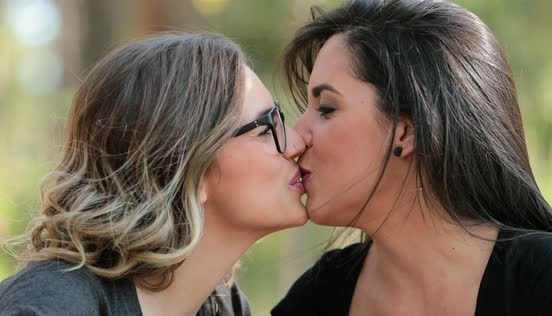
Don't engage in homophobic jokes, comments, slurs, and
other behavior. Speak up against these when you witness
them. If you don't, your silence condones and encourages
such behaviors.
Educate yourself. If there are things you don't know or
understand about LGBTQ issues, do some research, ask
questions or contact a group that deals with these
issues.
Talk about sexual diversity. Maintain an inclusive
group, classroom, living or workspace by talking openly
and respectfully about LGBTQ issues when they come up.
Treat these issues as you would any other issue.
Remember that an individual's sexual orientation
involves more than just sexual behavior. It includes
attraction, romance, companionship, intimacy, love, and
emotional attachments as well as sexual activity.
Do not force people to hide their sexual orientation or
gender identity.
Don't assume that LGBTQ people are suffering or have
regrets about their sexual orientation and want to be
heterosexual. Likewise, if someone who is LGBTQ is
having problems, don't assume that sexual orientation is
the cause.
Recognize intersections and similarities of prejudice.
Heterosexism and other forms of oppression and
discrimination have similarities and areas of overlap.
For example, a black lesbian may experience homophobia,
racism and sexism. An East Asian man may be
disadvantaged by racism in ways that are similar to the
ways a gay man is disadvantaged by homophobia and
heterosexism.
Engage in inclusive practices. Create work, study and
living environments in which gender and sexual diversity
are included, modeled and valued.
[Source: McGill Equity Subcommittee on Queer People, McGill
University, Montreal, Quebec]
Definitions: Homophobia, Heterosexism,
Sexual Prejudice
This is What Homophobia Feels Like
Getting Up Close to Homophobia
Microaggressions: What LGBTQ People
Endure Daily
Transphobia Explained
Heteronormativity Explained
PBS Frontline: Are You Homophobic?
Info: LGBTQ
Discrimination
Internalized Homophobia:
What is it? And How Do You Overcome it?
Gregory Herek: Understanding Sexual
Prejudice
Wikipedia: Heterosexism
Lady Gaga: Till it Happens
to You
Info: Cisnormative
HOME
QUEER CAFE
│ LGBTQ Information Network │ Established 2017 |